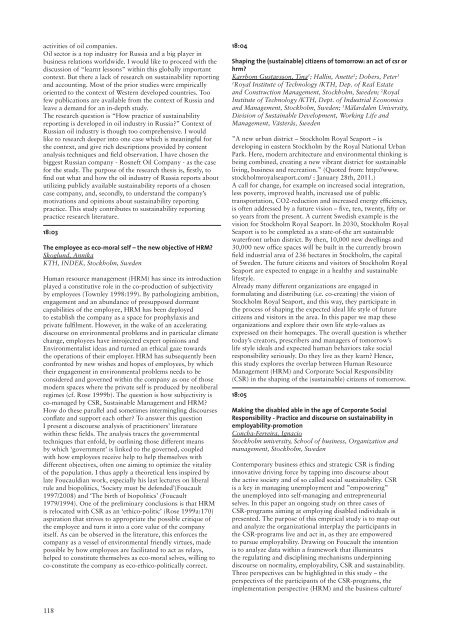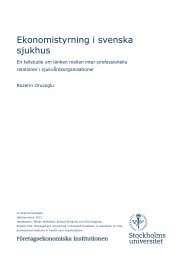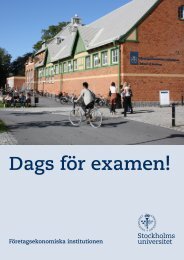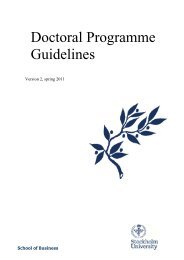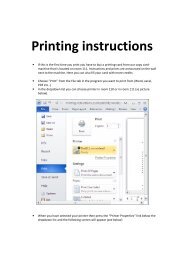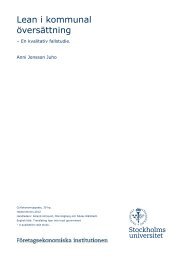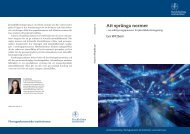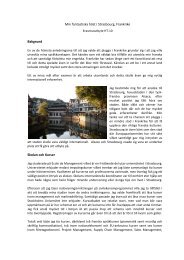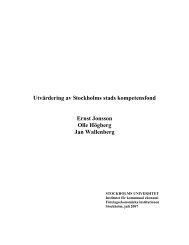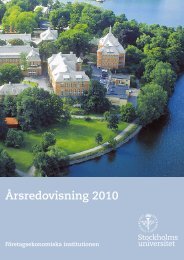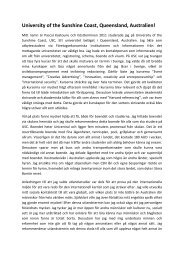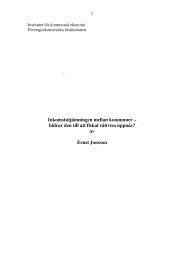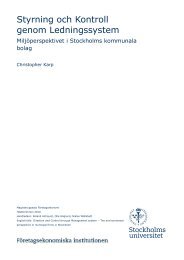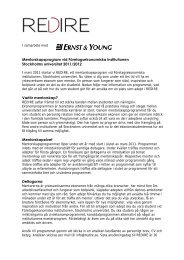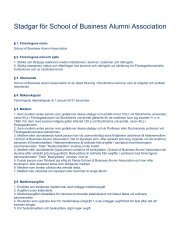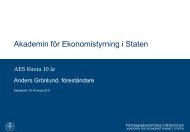Download full programme and abstract book pdf 1.6
Download full programme and abstract book pdf 1.6
Download full programme and abstract book pdf 1.6
You also want an ePaper? Increase the reach of your titles
YUMPU automatically turns print PDFs into web optimized ePapers that Google loves.
activities of oil companies.<br />
Oil sector is a top industry for Russia <strong>and</strong> a big player in<br />
business relations worldwide. I would like to proceed with the<br />
discussion of “learnt lessons” within this globally important<br />
context. But there a lack of research on sustainability reporting<br />
<strong>and</strong> accounting. Most of the prior studies were empirically<br />
oriented to the context of Western developed countries. Too<br />
few publications are available from the context of Russia <strong>and</strong><br />
leave a dem<strong>and</strong> for an in-depth study.<br />
The research question is “How practice of sustainability<br />
reporting is developed in oil industry in Russia?” Context of<br />
Russian oil industry is though too comprehensive. I would<br />
like to research deeper into one case which is meaningful for<br />
the context, <strong>and</strong> give rich descriptions provided by content<br />
analysis techniques <strong>and</strong> field observation. I have chosen the<br />
biggest Russian company - Rosneft Oil Company - as the case<br />
for the study. The purpose of the research thesis is, firstly, to<br />
find out what <strong>and</strong> how the oil industry of Russia reports about<br />
utilizing publicly available sustainability reports of a chosen<br />
case company, <strong>and</strong>, secondly, to underst<strong>and</strong> the company’s<br />
motivations <strong>and</strong> opinions about sustainability reporting<br />
practice. This study contributes to sustainability reporting<br />
practice research literature.<br />
18:03<br />
The employee as eco-moral self – the new objective of HRM?<br />
Skoglund, Annika<br />
KTH, INDEK, Stockholm, Sweden<br />
Human resource management (HRM) has since its introduction<br />
played a constitutive role in the co-production of subjectivity<br />
by employees (Townley 1998:199). By pathologizing ambition,<br />
engagement <strong>and</strong> an abundance of presupposed dormant<br />
capabilities of the employee, HRM has been deployed<br />
to establish the company as a space for prophylaxis <strong>and</strong><br />
private fulfilment. However, in the wake of an accelerating<br />
discourse on environmental problems <strong>and</strong> in particular climate<br />
change, employees have introjected expert opinions <strong>and</strong><br />
Environmentalist ideas <strong>and</strong> turned an ethical gaze towards<br />
the operations of their employer. HRM has subsequently been<br />
confronted by new wishes <strong>and</strong> hopes of employees, by which<br />
their engagement in environmental problems needs to be<br />
considered <strong>and</strong> governed within the company as one of those<br />
modern spaces where the private self is produced by neoliberal<br />
regimes (cf. Rose 1999b). The question is how subjectivity is<br />
co-managed by CSR, Sustainable Management <strong>and</strong> HRM?<br />
How do these parallel <strong>and</strong> sometimes intermingling discourses<br />
conflate <strong>and</strong> support each other? To answer this question<br />
I present a discourse analysis of practitioners’ literature<br />
within these fields. The analysis traces the governmental<br />
techniques that enfold, by outlining those different means<br />
by which ‘government’ is linked to the governed, coupled<br />
with how employees receive help to help themselves with<br />
different objectives, often one aiming to optimize the vitality<br />
of the population. I thus apply a theoretical lens inspired by<br />
late Foucauldian work, especially his last lectures on liberal<br />
rule <strong>and</strong> biopolitics, ‘Society must be defended’(Foucault<br />
1997/2008) <strong>and</strong> ‘The birth of biopolitics’ (Foucault<br />
1979/1994). One of the preliminary conclusions is that HRM<br />
is relocated with CSR as an ‘ethico-politic’ (Rose 1999a:170)<br />
aspiration that strives to appropriate the possible critique of<br />
the employee <strong>and</strong> turn it into a core value of the company<br />
itself. As can be observed in the literature, this enforces the<br />
company as a vessel of environmental friendly virtues, made<br />
possible by how employees are facilitated to act as relays,<br />
helped to constitute themselves as eco-moral selves, willing to<br />
co-constitute the company as eco-ethico-politically correct.<br />
118<br />
18:04<br />
Shaping the (sustainable) citizens of tomorrow: an act of csr or<br />
hrm?<br />
Karrbom Gustavsson, Tina 1 ; Hallin, Anette 2 ; Dobers, Peter 3<br />
1 Royal Institute of Technology /KTH, Dep. of Real Estate<br />
<strong>and</strong> Construction Management, Stockholm, Sweden; 2 Royal<br />
Institute of Technology /KTH, Dept. of Industrial Economics<br />
<strong>and</strong> Management, Stockholm, Sweden; 3 Mälardalen University,<br />
Division of Sustainable Development, Working Life <strong>and</strong><br />
Management, Västerås, Sweden<br />
”A new urban district – Stockholm Royal Seaport – is<br />
developing in eastern Stockholm by the Royal National Urban<br />
Park. Here, modern architecture <strong>and</strong> environmental thinking is<br />
being combined, creating a new vibrant district for sustainable<br />
living, business <strong>and</strong> recreation.” (Quoted from: http://www.<br />
stockholmroyalseaport.com/ : January 28th, 2011.)<br />
A call for change, for example on increased social integration,<br />
less poverty, improved health, increased use of public<br />
transportation, CO2-reduction <strong>and</strong> increased energy efficiency,<br />
is often addressed by a future vision – five, ten, twenty, fifty or<br />
so years from the present. A current Swedish example is the<br />
vision for Stockholm Royal Seaport. In 2030, Stockholm Royal<br />
Seaport is to be completed as a state-of-the art sustainable<br />
waterfront urban district. By then, 10,000 new dwellings <strong>and</strong><br />
30,000 new office spaces will be built in the currently brown<br />
field industrial area of 236 hectares in Stockholm, the capital<br />
of Sweden. The future citizens <strong>and</strong> visitors of Stockholm Royal<br />
Seaport are expected to engage in a healthy <strong>and</strong> sustainable<br />
lifestyle.<br />
Already many different organizations are engaged in<br />
formulating <strong>and</strong> distributing (i.e. co-creating) the vision of<br />
Stockholm Royal Seaport, <strong>and</strong> this way, they participate in<br />
the process of shaping the expected ideal life style of future<br />
citizens <strong>and</strong> visitors in the area. In this paper we map these<br />
organizations <strong>and</strong> explore their own life style-values as<br />
expressed on their homepages. The overall question is whether<br />
today’s creators, prescribers <strong>and</strong> managers of tomorrow’s<br />
life style ideals <strong>and</strong> expected human behaviors take social<br />
responsibility seriously. Do they live as they learn? Hence,<br />
this study explores the overlap between Human Resource<br />
Management (HRM) <strong>and</strong> Corporate Social Responsibility<br />
(CSR) in the shaping of the (sustainable) citizens of tomorrow.<br />
18:05<br />
Making the disabled able in the age of Corporate Social<br />
Responsibility - Practice <strong>and</strong> discourse on sustainability in<br />
employability-promotion<br />
Concha-Ferreira, Ignacio<br />
Stockholm university, School of business, Organization <strong>and</strong><br />
management, Stockholm, Sweden<br />
Contemporary business ethics <strong>and</strong> strategic CSR is finding<br />
innovative driving force by tapping into discourse about<br />
the active society <strong>and</strong> of so called social sustainability. CSR<br />
is a key in managing unemployment <strong>and</strong> ”empowering”<br />
the unemployed into self-managing <strong>and</strong> entrepreneurial<br />
selves. In this paper an ongoing study on three cases of<br />
CSR-programs aiming at employing disabled individuals is<br />
presented. The purpose of this empirical study is to map out<br />
<strong>and</strong> analyze the organizational interplay the participants in<br />
the CSR-programs live <strong>and</strong> act in, as they are empowered<br />
to pursue employability. Drawing on Foucault the intention<br />
is to analyze data within a framework that illuminates<br />
the regulating <strong>and</strong> disciplining mechanisms underpinning<br />
discourse on normality, employability, CSR <strong>and</strong> sustainability.<br />
Three perspectives can be highlighted in this study – the<br />
perspectives of the participants of the CSR-programs, the<br />
implementation perspective (HRM) <strong>and</strong> the business culture/


